Nick Riewoldt on football, family and the future
WE’VE known Nick Riewoldt for a long time — he’s a footballer, father and the longest-serving captain of the Saints. Now the former skipper opens up to Hamish McLachlan about footy, family and his future.
VIC News
Don't miss out on the headlines from VIC News. Followed categories will be added to My News.
Nick Riewoldt book extract
- Danny Frawley: My secret pain
- Where Geelong’s tough skipper Joel Selwood gets his inspiration
- Popular broadcaster Rex Hunt on fishing, footy and family
WE’VE known Nick Riewoldt as a footballer for a long time. Admired him as the longest-serving captain of the Saints who had a huge work ethic and almost led the Saints to the premiership, twice. We also know he was at the club amid a number of off-field scandals, and tragically lost his sister in 2015. Since then, Nick has shown a resilience, and a side of him, that many didn’t know existed. Nick’s book is released tomorrow. It’s called The Things That Make Us. It turns out there’s a lot to Nick that we didn’t know.
BOOK EXTRACT: LOOK OUT FOR RIEWOLDT’S MAGPIE BOMBSHELL AT HERALDSUN.COM.AU FROM 6PM
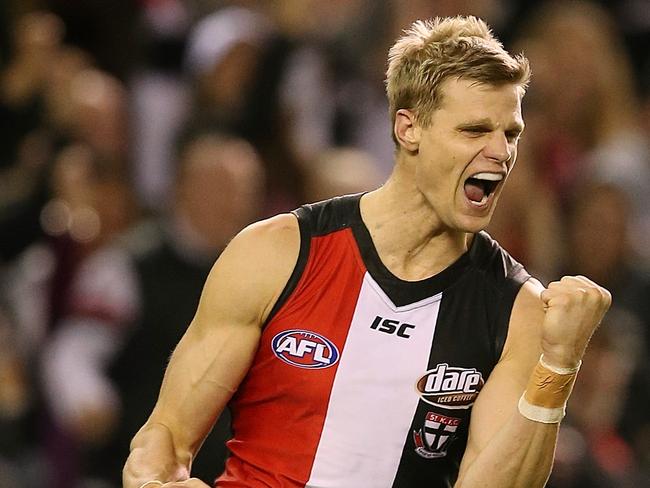
HM: Roo, the book is outstanding. You’ve laid yourself completely bare.
NR: Yep. I felt there was no point doing it if I didn’t! I didn’t want to write a stereotypical footy book from the U/8’s through to the big time. The motivation was to try and write something relatable, and I think you need to show vulnerability to be able to do that, particularly when you’ve lived the sort of life that an AFL footballer does. That was the way I thought it was going to be interesting to a reader, to lay myself as bare as possible and show some vulnerability. I didn’t want to necessarily tip the bucket on anyone, because I feel like at times people need to do that to sell books, but I thought given a lot of the things that have transpired within that story, it was compelling enough without doing that.
HM: It must have been very difficult. There’s some stories you tell in there that you didn’t need to tell that are against yourself. Whether you’re getting fish and chips and there are blokes abusing you, or you’re back at home and your house is getting egged, you’ve put everything in there.
NR: I thought I wanted to be honest with myself, and all the readers, and I just didn’t want to be selective about what was in there and what wasn’t, because I feel like people can see through that. It’s all in there. The name of the book is The Things That Make Us, and in this instance, the things that have made me. It’s all from my perspective. This is what occurred, this is how it made me feel, and this is how it shaped me.
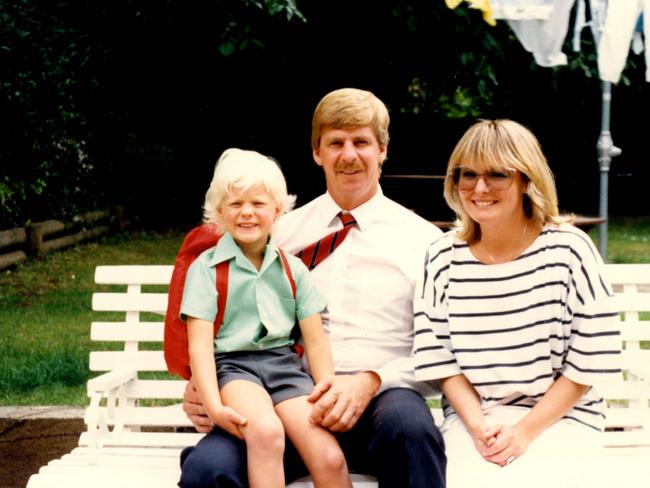
HM: When did you think you had a story to tell?
NR: It’s something that I’ve never really wanted to do, just because I didn’t think my story was compelling enough, but I was approached about doing one. In the aftermath of losing Maddie and the challenges surrounding that, I felt I might have something to share. I think post losing Maddie, people have seen a side of me that they probably haven’t seen before. The idea was floated to do something different, to not go down the path of writing a standard football book, and that’s what really appealed to me. I had the support of the publishers, Allen & Unwin, and had the opportunity to team up wither Peter Hanlon, who’s just done an amazing job getting it all out of me. That’s a challenge after 17 years of media training and being very, very guarded! Once the vision became clear about what we were actually going to do, that’s when I thought yeah, I’ve got something to tell.
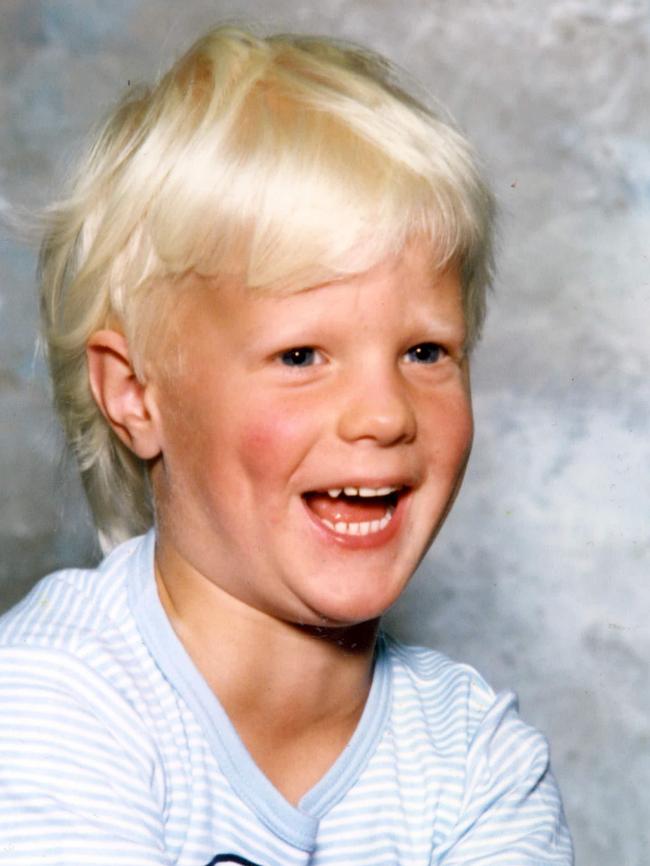
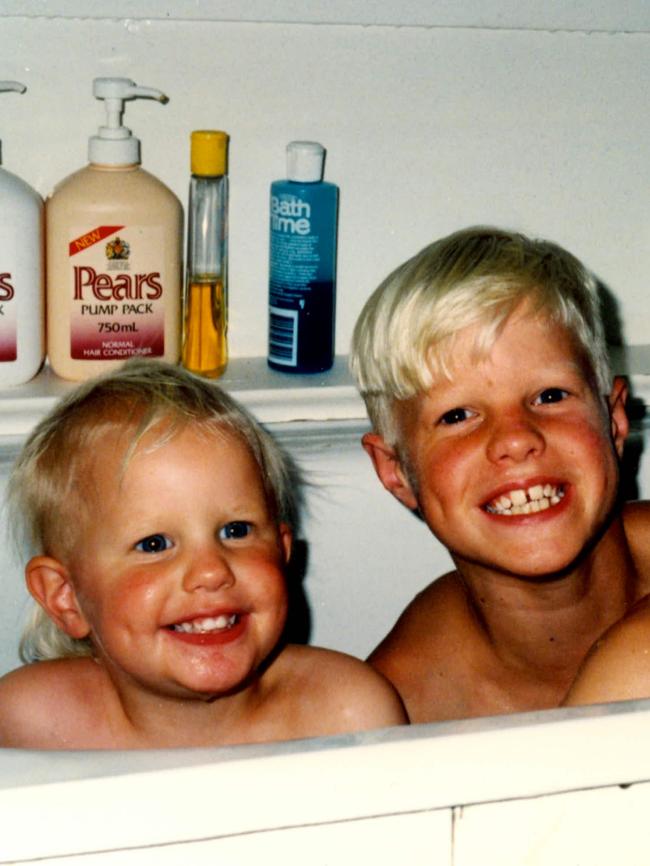
HM: What was the process with Pete?
NR: Once we worked out the framework, then it was up to me to identify the things that had happened to me. What are the interesting aspects, relationships and events that have really shaped who I’ve become? Once we identified those, we basically just sat down like this and spoke about them. One by one. It was quite methodical, and it wasn’t chronological.
MY HERITAGE GAVE ME STRENGTH
HM: That’s what I find really interesting about the book. I was expecting it to start with football somewhere, but it starts with your grandparents. Every chapter is a different part of your life, with no chronological link.
NR: You can read every chapter in isolation. Initially I was a little bit hesitant about doing it that way, because I thought it would become a little bit disjointed, but I think it reads quite well. You can go to bed, you can read a chapter and pick up the next night and not have to go back and read the last three pages to work out exactly where you were. The heritage chapter, for example. We went down to Tassie and interviewed my grandparents for three hours. We sat down over some schnitzel and potato salad at their house in Tassie, and it was so educational for me. A lot of the stories that they spoke about I’d never heard before. The motivation for me to doing that was as much about me writing a book as it was for prosperity’s sake. To get it down on paper and actually have the blessing to publish it was incredible. Now my boys will be able to grow up and know who their great-grandparents were, and know their great-grandparent’s stories. That’s a pretty special thing.
HM: You’ve got a German father, a Tasmanian mother and an American wife — you’re worldly. Your German grandparents on your father’s side sat down with you and told you their life story. They told you about growing up in Berlin during the war, which is extraordinary. It’s my favourite chapter in the book. What did you learn?
NR: I learnt that this is why they are, how they are. That’s what it was to me. Any issues anyone has, with respects to their personality or any traits, have to have come from somewhere. Hearing those stories about the way they grew up and what they experienced gave me a sense of: OK, I get it. I get why you are this way. They’re both very, very different. Pa speaks about what happened in almost a jovial kind of manner. We move on, and he’s almost upbeat. With Oma, it’s clear that she still carries a lot of that with her. That flowed into the way they raised my father, so I was able to put all those pieces together and actually see: OK, this is how they got to where they got to, and this is why they raised my dad a certain way. That was the most interesting aspect for me.
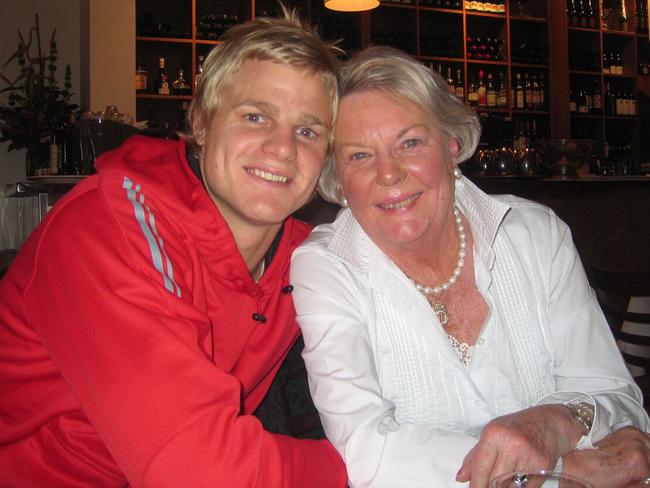
HM: A cellar saved their lives. It was where they hid during the bombings in the war?
NR: Yep, a cellar and someone that could speak Russian saved their lives. When the Russians invaded, they came through my grandmother’s house. They were hiding in the basement, but someone could speak Russian and told them to keep going.
HM: “No Germans here.”
NR: Exactly. A girl upstairs wasn’t so fortunate, about the same age as my grandmother. Raped and killed. Having listened to the stories about how close they got to dying so many times throughout the war, it’s amazing that I’m here, and gives you a sense of how lucky most of us are.
HM: Your grandfather at 15 was carted away to a camp, and when he came back to where he grew up, to home, there was nothing left! There’s the one story when he’s crossing the river, and he pretends he’s going to give them his watch, as a bartering tool to allow him to cross, which he doesn’t have.
NR: That’s right. He was waving his arm saying “watch, watch” as if he would give them his watch as a gift for letting him cross. He didn’t have a watch, he didn’t have anything. Just as he got to the other side he pretended he dropped it, and said it had floated down the river. They believed him and let him go.
My heritage has given me strength, and it’s helped me become the person I am
HM: (Laughs) There’s a great line in the book where you say: “I’m a descendant of people that have known hardship. My heritage has given me strength, and it’s helped me become the person I am”. Your great-grandfather lived with a bullet in his skull for most of his life. He fought in World War I?
NR: He fought in World War I, and his job was to signal to the soldiers whether they were shooting long or shooting short. Well, he got shot in the head, so they were shooting short!
HM: But he survived?
NR: He did.
HM: We spoke about a German father; a Tasmanian mother. There’s a line in the book where you say: “You are fiercely Australian, and fiercely Tasmanian”. I always thought that you were from Queensland, but you didn’t move there until you were 10?
NR: That’s right. A lot of people think I’m a Queenslander. I was drafted out of Gold Coast, so I guess that’s why people make that assumption. I’m a Tasmanian; all of my roots are in Tassie. A lot of my family is still there, and all of my grandparents are still there. We’ve got a place on the east coast, which is very special to us. We’ve been there for a long time as a family.
CRICKET HELPED START MY CAREER
HM: I didn’t know you were a better cricketer than footballer as a kid. You were a state rep every year from the U/13s. You were in the ‘Pace Australia Squad with Mitch Johnson, Shane Watson and Nathan Rimmington. A left arm quick.
NR: I wasn’t super-fast, but I could swing it. My big in-swinger was my stock ball, coming back into the right-hander, and occasionally I’d push one across and get them nicked, caught behind or in the slips. I played a lot of cricket, and I really wanted to be a cricketer. My first best and fairest I ever won in footy was at St Kilda, so I wasn’t a prodigy as far as a junior football player, but I was pretty good at cricket.
HM: Ray Frost really taught you how deep you could go within yourself, and that changed your footy?
NR: Yeah it did. Frosty was just a local cricket coach, but he was the toughest coach. Junior coaches are always quite encouraging, and Frosty was that, but he was tough. One summer I just put in so much work, and twice a week for an hour I was in the nets with Frosty. I remember coming down and I had a long sleeve top on with a footy jumper over the top. He just looked at me and said “Take that off son, you’re going to be sweating”. I had no idea what he had in store for me. He didn’t throw cricket balls, he threw the dimpled hockey balls, because they would come off the deck so much faster and almost spit at you off the turf. He got me to the point where I was technically very good at being able to protect my wicket. I wasn’t a slogger; I was very technical, to the point that it drives the boys nuts every time we play backyard cricket.
HM: Geoffrey Boycott?
NR: Yeah, I just value my wicket too highly. He would stand halfway down the pitch and throw the ball up in the air, and actually hit the balls at me with a bat. He’d smack them into the ground, they’d fly up, and it was all about self-preservation. You don’t need to play a shot; you just need to protect yourself. I was frightened, but I think it was good for my footy. My hand-eye became really good, and the next year I came out and just started taking a lot more marks. I put it down to the work I put in the nets, the hand-eye, and just a bit more toughness as well. It gave me the ability to throw myself into the contest. I credit a lot of my development football wise to one of my cricket coaches.
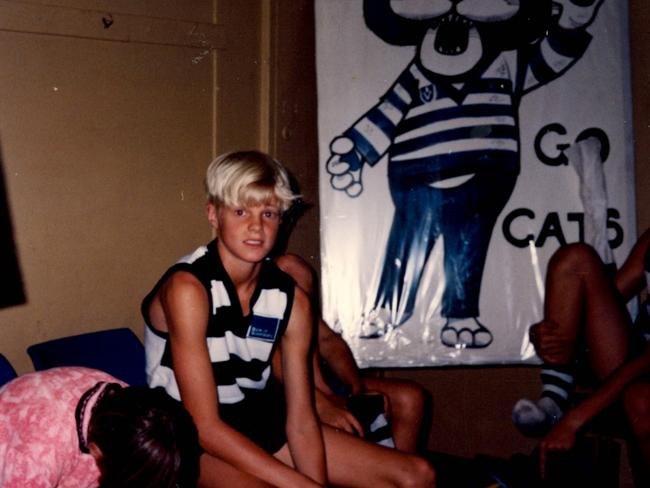
HM: There’s a really interesting chapter about inexperience. It’s called “(in) experience”. You talk a lot about your naivety early on in your career, particularly in the media. There’s some moments on The Footy Show you wish you could have again?
NR: I cringe thinking about it. Horrible, horrible stuff. Coming onto the scene in my first year I did nothing, but my second year really took off. I went onto The Footy Show, and I’d had a little bit of exposure to that sort of stuff. I started to become more of a regular on the show during my third, fourth and fifth years. I’d seen the way Crawf and Aker interacted with the crowd. They were smartasses trying to be funny. That was their go; that was their schtick. I’m not a funny bloke, but I tried to be, and it just backfired horribly. The crowd were talking over me, and I told them to shut up, and they just turned on me. They didn’t like it, and watching it back it was just excruciating, and so embarrassing. I got the feedback from Dad and Thommo that I’d embarrassed myself.
HM: Did you trust the media when you arrived as a footballer?
NR: I was just naive. I didn’t really trust or not trust the media, I just had no idea as to the power of it. Coming from the Gold Coast meant it was a very low key draft for me. Now you look at the number one pick and they’re spoken about 18 months in advance! I came from the clouds. A lot of my school friends didn’t know that I’d been drafted before I told them I was moving to Melbourne. They said “Oh, are you going to uni down there?”, so I had to actually tell them I was going down to play footy. They had no idea.
HM: The first time you saw the media frenzy was when Blighty was sacked?
NR: Yep, in my first year. What a whirlwind. I bumped into Blighty this finals series, and 17 years ago I played my first game, which turned out to be Malcom’s last. I hold some sort of record for having five coaches in five games of footy. I got drafted after the Grand Final for Southport, so Jason Cotter was my coach there. The first game I played after getting hurt was midyear for Springvale reserves team, and I can’t remember the coach’s name. The next week was the Springvale seniors. The next week I got promoted again, played AFL, and made my debut in Round 15 at Etihad Stadium. Malcolm Blight was my coach and we got beaten by Adelaide by 97 points. Malcolm got sacked on the Tuesday, and then Grant Thomas was the caretaker coach the following week.
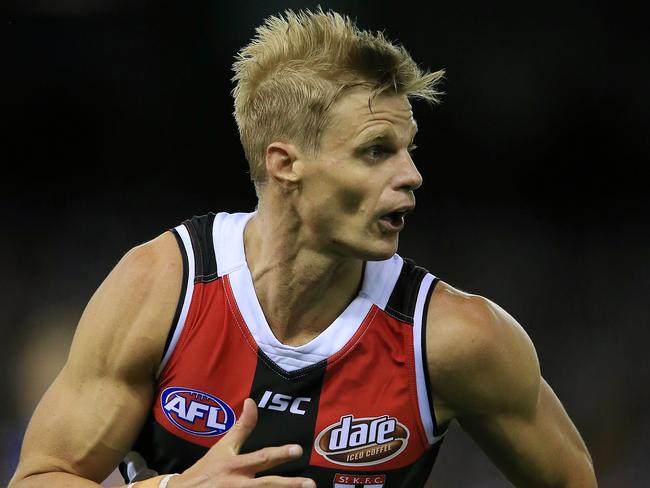
HM: 5 in 5.
NR: So when I’m getting introduced now as a past St Kilda player, and captain, they always leave that off. I’m going to put that on my bio. It’s a record that I hold!
HM: Just quickly back to Southport. As a 16-year-old you won the Southport Reserves grand final. They win the seniors as well. From what I read, it’s one of the great grand final parties of all time!
NR: It was incredible. Southport are a massive club. You only have to go up and look at their facilities to know that. They had better facilities as a footy club than St Kilda did when I walked in the door!
HM: You were going backwards?
NR:(Laughs) Yeah. They had a spare oval down the back, so they set up these huge marquees on it. They had a huge truck that was just full of alcohol. It was a refrigerated truck, and at some stage during the night they cut us off because everyone was getting too rowdy. It was very, very loose ... there’s a couple more stories in the book around that night.
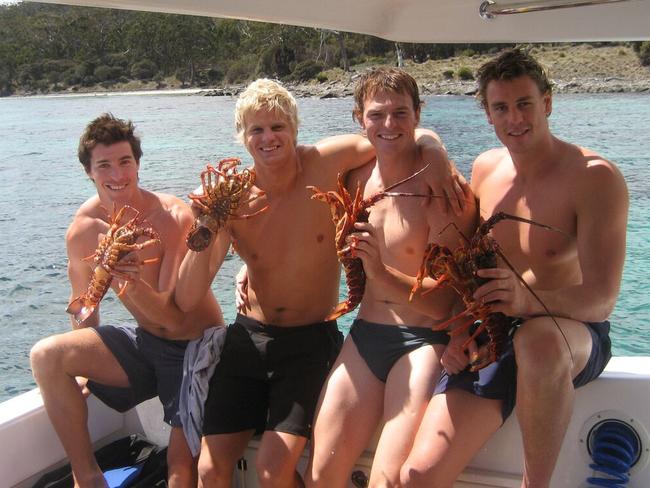
HOW I MANAGED LIFE IN THE SPOTLIGHT
HM: The spotlight. It burnt bright pretty much from the get go, and never came off. Did you get better at handling it?
NR: I think it fluctuated.
HM: The way you managed it?
NR: The way I managed it, and the way I handled it. I think I was pretty good at the start, but then I went through a period of getting a bit carried away by it all.
HM: Getting ahead of yourself?
NR: Getting ahead of myself, losing a bit of focus on what was important, and becoming consumed by an image throughout a period. I saw at various stages what the spotlight did to some of my teammates. I endured some of the scandals that we did, and they were, I guess, a bit of a warning tale. Then there came a time when it shone very brightly on me, which I found to be a very difficult period.
HM: That’s the St Kilda School Girl stuff, Maddie’s passing, or a combination?
NR: I was blown away by how respectful the media were throughout Maddie’s illness, and her passing away. The media endeared themselves to our family, with how respectful they were through that whole process.
HM: They got the St Kilda scandal wrong though. You’ve never met that girl?
NR: I’ve never met her.
HM: But it was written up as if you had?
NR: It was written up as though she’d taken photos of me. It would have been really, really easy for the media to just say look, this is a lie, she clearly didn’t take the photos, they’ve been stolen, done. They had that opportunity, but they chose not to because it was sexier to string it along. She came out later and said it was all a lie.
I didn’t handle it very well, and I don’t think we handled it very well as a footy club. There are things you’d do differently again, but the hardest part was to almost just passively watch this event snowball, and have no control over where it was heading. That was really difficult. I hadn’t been with Catherine all that long. Her family were back on the other side of the world, and they were seeing the media reports, which were misrepresented. It was a tough period.
STAYING AT ST KILDA SAVED MY RELATIONSHIP
HM: How big an impact did the St Kilda schoolgirl saga have on you? Maddie’s diagnosis and that coming out were quite close together. Did you get close to pulling the pin?
NR: And we’d just lost back to back grand finals I did get close. In retrospect, I’m really disappointed that I let it affect me as much as I did, because there was bigger stuff happening in our family. It affected my family as well. Mum and Dad, my brother and sister, they wore it as hard as anyone. It was a tough period.
HM: Would you be with Cath if you hadn’t met Cath before the scandal?
NR: I wouldn’t, no.
HM: So that just shows you how life changing this can be?
NR: Yep. The fact that we had a year together before this happened meant that we were able to get through it.
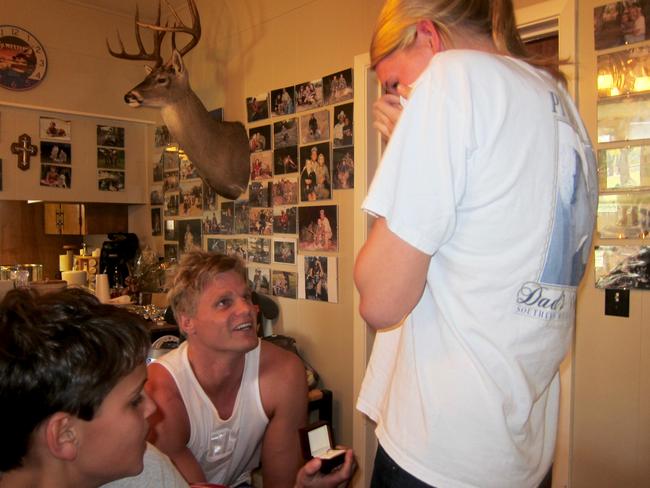
HM: Because her parents live a very Christian life, and they wouldn’t have allowed it to go forward?
NR: No they wouldn’t, because they would have Googled my name and read all the reports. Cath’s father already had me down for three strikes. One — he’s a football player. Two, she met him in Vegas. Three, he lives on the other side of the world. If you threw in a nude photo scandal, that would have been the fourth strike. I don’t think we would have gone too far.
HM: I like the fact that being a one club player actually helped you find your wife.
NR: Yeah it did. After Cath and I met, when she got back to Texas, there was a little bit of follow up. When Cath’s mum found out that we were still talking, she Googled my name, and one thing that really resonated with her was the fact that I was a one club player. I think she thought I was a loyal guy! That was the reason Cath received her blessing to come out for the first time.
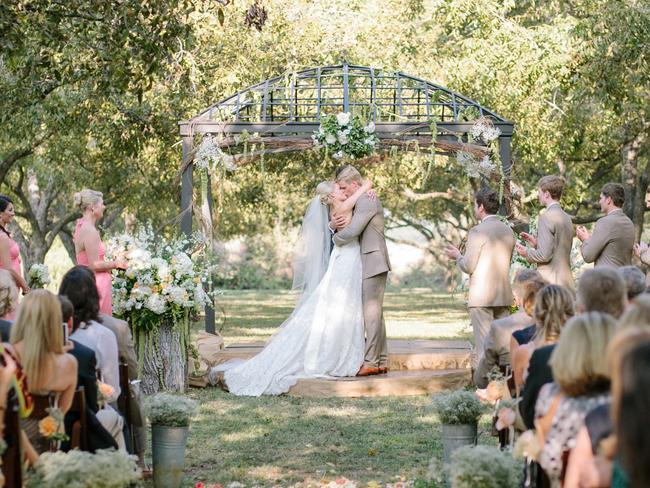
HM: On to captaincy and leadership, nobody has captained the club for longer, or for more games. When do you reckon you were at your best as a leader or as a captain? Did you grow into the role? Did you get better at it?
NR: I think 2008 was when I really started to forge my identity as a leader. I was struggling halfway through the year, and the team was really struggling. It was on the back of Ross Lyon adapting his philosophy on coaching. We had a really talented group, but we didn’t hold each other as accountable as we should have. Rossy just said that we weren’t to be held captive by talent anymore, and that we were going to go down the path of high accountability.
From there my style became a bit more uncompromising, holding guys really accountable, and holding myself really accountable. That was the way I acted throughout that period of pretty sustained performance. That was when I was at my best as a leader, but it was also the best team I played in. I had a lot of support around me. Lenny Hayes, Brendon Goddard, Nick Dal Santo, Luke Ball, Justin Koschitzke, Leigh Montagna; we had so many leaders, so my job was made easier. The buy in we had from the group was unbelievable, but then I had to change my leadership style a little bit, and that had its own challenges.
I STILL THINK ABOUT LOSING THE GRAND FINAL
HM: Three Grand Finals in two years. 2 losses, and a draw. When you look back and think about those games, what’s your immediate feeling?
NR: It just makes me feel sick.
HM: Does it still?
NR: Yeah, still.
HM: How often do you think about it?
NR: In some way every day I’d think. If it’s not every day, it’d be at least once a week. During the footy season it would probably be every day, because there’s a reminder somewhere within the footy landscape every day. When I really drill down into it, it would be different if there were regrets associated with it but there was nothing from an effort point of view that anyone could have done any differently, so how can I be mad at myself or anyone else? There’s no blame, it’s just the way it went. It was two teams both competing, having a red hot crack, and there had to be a winner and a loser. Would it make my life so much different and so much better if I won one? I’m not sure that it would. I wish it was different, but there’s nothing anyone could have done.
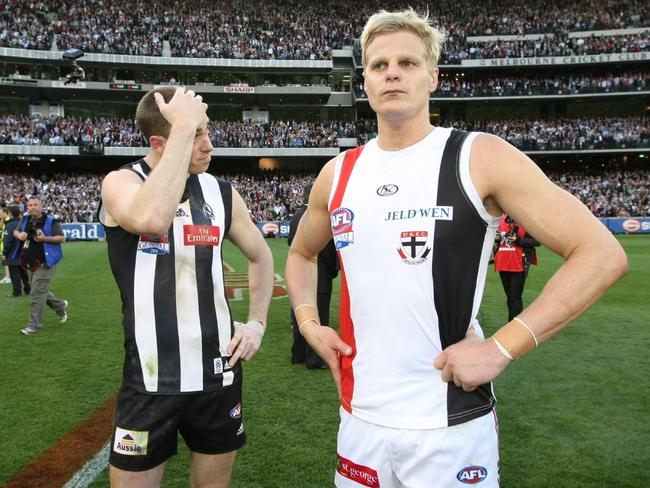
HM: It is interesting. You say how you wonder whether your life would be different. Do you feel differently about yourself because you haven’t won one?
NR: A little bit.
HM: Do you think there’s a difference between a 300 game player and a 300 game premiership player?
NR: Yeah I think there is, and that’s OK. I understand that little hole, as far as my career goes, is always going to be there. I can’t change that now.
HM: You’ve got to be at peace with it.
NR: Yeah.
HM: And you’re going to have to find peace?
NR: I need to find ways to be at peace with it. I need to have those little thoughts in my head to realise it’s not the be all and end all, because otherwise you just drive yourself mad. I’m in a position to have real perspective given I now know what real loss is. I did an interview after the 2009 Grand Final, maybe a few months after a preseason, and I spoke about the feeling of losing the grand final. I remember saying “It feels like someone has died”. I look back at that and just think gosh, how insensitive was it to say that! It’s all relative, because that’s how you feel in the moment, so it is what it is, but now I know what real loss feels like. I feel a bit silly for having said that.
WHY I’LL NEVER GET OVER LOSING MADDIE
HM: Your sister, Maddie was diagnosed with bone marrow failure in July 2010 and passed away in February 2015, does get any easier with time?
NR: I don’t think so. A lot of people have said that it gets easier over time, but for me it’s just longer since I’ve seen her. We’re almost out to 3 years since I’ve seen her, and she was in hospital a year before that, so we’re almost out to 4 years since I’ve seen Maddie as I remember, or as I want to remember Maddie. I’m not sure that time heals all wounds in that type of situation. I don’t think I’ll ever get over it.
HM: How are your parents coping?
NR: Like any parents would. You’re never the same, and you’re broken, but having grandchildren helps. Maddie’s Vision has helped us all as a family, being able to do something positive with our grief. Meeting other families, drawing strength from their stories. It’s a battle every day.
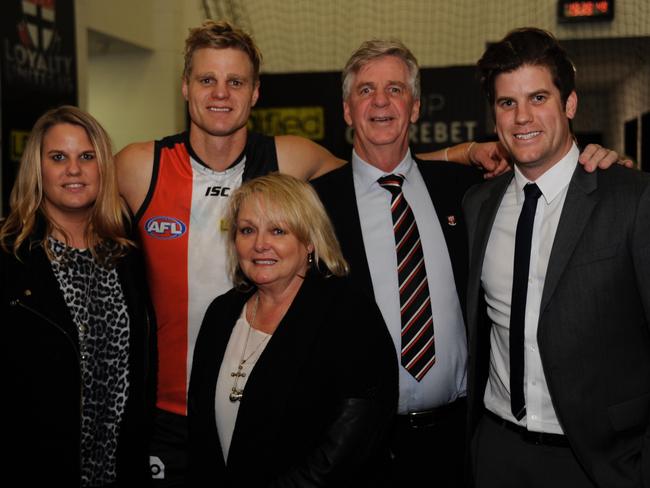
HM: My grandmother once said something that’s always stuck with me, and it’s probably more pertinent now that I’ve got three kids. She just buried her second child, and she said “No parent should ever have to bury a child”. It’s just unfathomable.
NR: Now that I’m a father I just don’t want to think about it. You become a parent and your whole purpose becomes your kids. Every decision you make, and everything you do becomes about providing a good life for them. I can’t even think about what that must be like for my parents.
HM: What do you learn out of something like Maddie’s ordeal about yourself, about life, about friends and family?
NR: Sometimes I’m just amazed at how we’re able to function as people through those things. I think back to getting the phone call from Dad at 5am to drive in to the hospital, knowing that I was driving in to say goodbye to my sister. I just don’t know how, as people, we’re able to get through those things, but something just takes over. It’s almost like a protective mechanism to live and function.
I’m in a position to have real perspective given I now know what real loss is.
HM: You stumbled upon a quote on grief that helps you. It’s pretty extraordinary; where did it come from?
NR: I don’t know; I think someone sent it to me one day.
HM: What is it?
NR: It says “Grief, I’ve learnt, is really just love. It’s all the love you want to give, but cannot. All of that unspent love gathers up in the corners of your eyes, the lump in your throat, and in that high part of your chest. Grief is just love, with no place to go”. It’s a feeling born of having had something special. I feel like we grieve so hard because we love so hard. I found that quote really helpful.
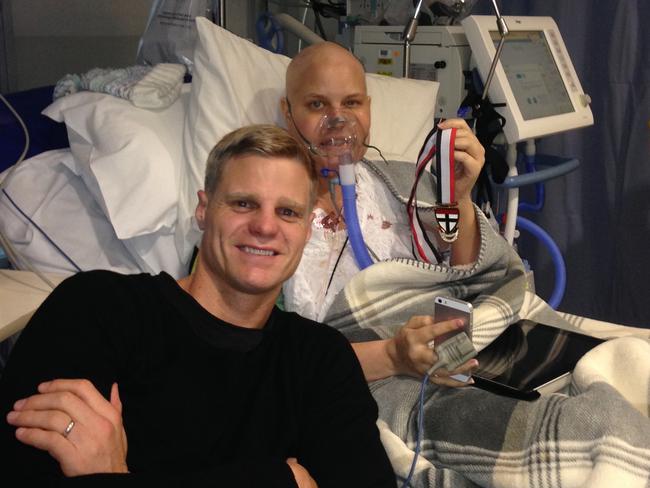
HM: The book is for two people. James and William. There’s not much they won’t know about your family after reading it.
NR: That was one of the big motivators for doing it, for posterity’s sake. I don’t think my kids will remember my footy career, although James might. I’m going to have to keep him hard and straight on the St Kilda path, because if he sings yellow and black one more time I might just lose my mind! They’ll be able to read this and know about their family. They’ll know what their great grandparents did, how they grew up in Germany or in Tassie. They’ll know how their mum and dad met in Texas. They’ll know about Dad’s footy career. They might just slip passed the scandal …
HM:(Laughs) Whose title was “The Things that Make Us”?
NR: It was a collaboration.
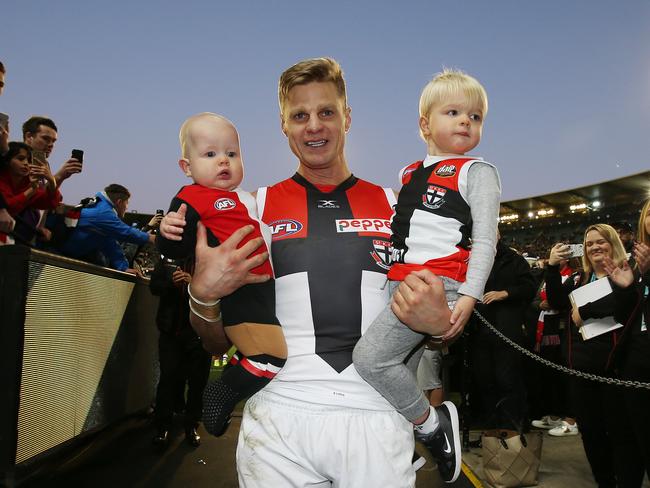
HM: It’s great.
NR: Yeah, it’s good. It was originally going to be “The Things that Made Me”, but the things that make us speaks to a much wider audience, because everyone can identify with people, places, and events that have shaped them. I hope that people that read this can find it either informative about a crazy footballer’s type of life, or they can find it relatable because they’ve experienced loss, or anxiety. I just hope there’s something within the pages for everyone.
HM: Are you concerned about what’s next?
NR: I’m not. I feel like that’s why I was really comfortable in my retirement, because I’m not at a point where I’m frightened. I’ve got a blank canvas for the first time in my life, which I’m really excited about. I’ve got great balance, I’ve got a great family, so I hold no fears.
HM: We’re all products of our environment. With you and Cath as parents, your kids are very lucky. Well done.
NR: Thanks mate.
Nick Riewoldt — The Things that Make Us, in stores on Monday. $39.99 Hardback. Allen & Unwin.
Nick will be touring around Australia to meet fans and sign copies: Tour schedule here.


